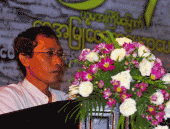Live from Burma: A Video Interview with Nyein Thit
by Sampsonia Way / October 3, 2012 / No comments
At the beginning of September, Sampsonia Way columnist Khet Mar was able to conduct a brief video interview with Nyein Thit, a Burmese poet, editor, and activist. In this video interview Nyein Thit discusses his documentaries on Burma’s labor camps, his time in prison, and being blacklisted. After the conversation Nyein Thit reads one of his poems, “Peace on the Table.” Watch the video above or read the transcript below.
Khet Mar also profiled Nyein Thit in her column Tea House:
When I travel, I often worry about my sons, even though I know they are with their father. When I think of the many things that can happen, I can’t help but worry. However, when I get too worried I remind myself of my friend Nyein Thit and his children.
Nyein Thit is a poet, but living in this era has made him a politician. When he was a university student in 1976 he was jailed for two years for participating in the Hmaing Centennial Strike commemorating the Burmese nationalist Thakin Kodaw Hmaing. He also participated in the notorious 1988 uprising. After 1988 he made his living as a poet and editor, although under Burma’s censorship policies he could not be openly credited for his editorial work…
Read the rest of Khet Mar’s profile of Nyein Thit here.
You have been in prison many times, but on 1999, you were arrested and sentenced to eight years in prison for your role in producing unauthorized video documentaries. What kind of documentaries you were producing?
I was in jail in 1976 for celebrating the 100th anniversary of the birth of the famous Burmese nationalist Thakin Kodaw Hmaing (1876-1964). I was a part of the Mandalay University student’s movement.
I was then jailed again for eight more years (1999- 2007), this time for sending news reports to foreign magazines and journals. We also made documentary films about forced labor camps. The worst was the one for political prisoners. We send those documentaries to foreign media.
Political prisoners in Burma are tortured without compassion. When they interrogated and tortured me I repeated to myself, “This awful time will not be forever, this is going to end soon.” I told myself that I didn’t have to reveal the name of my partners. How did you face that terrible experience?
The interrogation camps were terrible. There were many people who died in those camps. Others were blinded, or lost their hearing, or suffered amputations.
I was interrogated continuously over a 24-day period. I was tortured in different ways. I might be forced to stand all through the night with my hands tied. Or they would roll my shins with a grass roller or force me to kneel down on small pieces of broken glass. I was able to deal with those terrible times by thinking, reading, and writing poetry. I repeated to myself that I have to triumph over fear with love of truth.
You literary work has also brought you troubles with the government. Why do you do what you do? What do you hope your work accomplishes? Why is freedom to create literature important in a repressed society?
For people who create any kind of art, freedom of expression is very important. In March 1999, a magazine was shut down, because the editor published an article of mine. I was also arrested and was asked many questions. When the Nobel peace laureate Aung San Suu Kyi’s husband died, seven poets–including Min Thuwon, Monywar Aung Shin, Phyarpon Ni Lone Oo and me– were forbidden to write. Even our names and picture were not allowed to be included in any magazine or any book. We were blacklisted by the Censorship Board. For writers and poets, it is vital to have freedom of expression. It is also vital to secure human rights for everybody. We are fighting for those rights.
Could you read a poem for us?
Peace on the Table
Black clouds are crawling forward!
Will anthurium leaves in the children’s hands be able to protect them from this fatal rain?
“Dad…dad”, the scream for life, which blanketed the hill with the pagoda,
Thundering, swollen with desires.
Full of hungers,
Full of hopes,
Full of songs.
I wish the future were not so full!
Please be quiet for a moment!
Put your legs under the table….please be quiet for a moment!
Don’t disturb the peace flowers
That will soon blossom on the table.
On the door of dream
That hasn’t been touched by a drop of rain,
Sweet jingling sounds of bells are floating.





